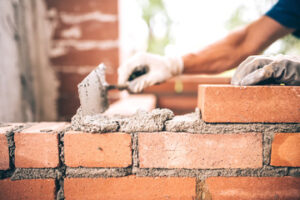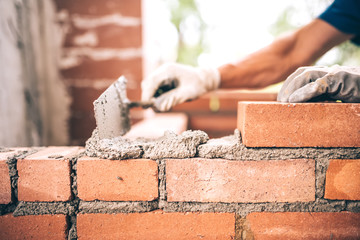Colorado Springs Masonry is a highly skilled craft that requires careful attention. It involves a great deal of manual labor and can be very stressful. It is best to find a supportive community and a mentor.
 Bricks and concrete blocks are the most common materials used in masonry construction. They can be weight-bearing and used to hold up a roof or they can be a decorative veneer.
Bricks and concrete blocks are the most common materials used in masonry construction. They can be weight-bearing and used to hold up a roof or they can be a decorative veneer.
Masonry is a construction technique that uses bricks, stone or concrete blocks joined together with mortar. It is one of the most durable and versatile building materials available. It can withstand weather, temperature changes and seismic events, making it a good choice for homes and businesses. Masonry can also help reduce energy costs by insulating the structure, which in turn saves money on heating and cooling expenses.
A construction company that uses masonry techniques can add value to the property it is building by making it more attractive. This material is easy to clean and maintain, and it is long-lasting, making it a good investment. In addition, masonry is fire-resistant, which helps protect the contents of a building and prevents damage from heat or smoke. It is also resistant to termites and other wood-destroying insect pests, and it is a great option in areas with high rates of infestation.
The earliest buildings were constructed with stone and other types of masonry. These early structures were often carved with intricate designs to make them look beautiful and decorative. Today, masonry is used for commercial and residential buildings, as well as public places. It can be built to withstand earthquakes, tornadoes and hurricanes. Masonry is also a sustainable material because it has a longer lifespan than other materials and requires less maintenance.
Masonry can be used for a variety of applications, including patios and driveways. It can also be used to build retaining walls, which help to keep soil from erosion. These walls can be made from stones or bricks, and they can be used to separate gardens, lawns, sidewalks, and driveways. Masonry can be a cost-effective choice for a building, as it can be crafted from recycled or salvaged materials.
It is important for a construction company to understand the limitations of masonry construction before using it on a project. Masonry projects may take longer to complete than other construction methods, and the work is typically done outside. This means that masonry construction teams must be prepared to face the elements, such as rain and low temperatures.
It’s easy to maintain
Masonry is one of the oldest types of construction and has stood up to the test of time. Its durability and low maintenance make it a great choice for homes, office buildings, and other structures. These structures are resistant to weather, fire, mold, and pests. In addition, they are strong and can withstand high winds and earthquakes.
However, it’s important to note that masonry is not indestructible and requires some regular care. It is important to clean your brickwork as soon as you notice any signs of wear or damage. Using a soft brush and a mild detergent will help you remove any dirt and debris without damaging the surface of your bricks or stones. It is also a good idea to use hand tools rather than power tools when cleaning masonry because abrasive tools can do serious damage to this material. Additionally, you should avoid using pressure washers with a high PSI, as these can cause long-lasting damage to the masonry.
Masonry that doesn’t receive much sunlight or is near wet vegetation is susceptible to moss, mold, and mildew growth. It is important to clean these areas as soon as possible because they can weaken the masonry by holding in moisture. Fortunately, it is fairly easy to keep your bricks and stone free from these problems. First, mix one cup of bleach with a gallon of water and soak the affected area of your masonry. After that, scrub the masonry with a scrub brush and rinse it off with water. Be careful when using a scrub brush, as steel brushes can leave behind residue that can rust and discolor the bricks.
Another benefit of masonry is that it offers more flexibility in building design than other materials, such as concrete. This allows you to create a unique look and feel for your home or business. In addition, masonry is also environmentally friendly. It is made from recycled materials and is less likely to pollute the environment than other types of construction materials.
It’s affordable
Masonry is an affordable option for homeowners looking to add value to their home. It is durable, looks great and offers many benefits. For example, masonry is resistant to rot, mold and fungus. It also acts as a sound barrier and helps to maintain heat, making homes energy-efficient. Furthermore, masonry is less expensive than wood structures, which require regular maintenance and repairs.
Concrete masonry is a great option for building fences and walls, as well as for creating retaining walls. Retaining walls keep soil from eroding and can be used to separate gardens, lawns, sidewalks, and driveways. Masonry walls are also attractive and can be painted or stained to match the surrounding landscape. Brick masonry also adds curb appeal to your property, which may be an important selling point when you are ready to sell your house.
Brick and stone are both durable materials that can withstand weather conditions, earthquakes, and high winds. They are also non-porous, which means they do not absorb moisture and are not susceptible to mildew or mold. Additionally, they are fire-resistant, which makes them a safe choice for residential and commercial buildings.
Masonry construction is cost-effective because it eliminates the need for a timber frame, and allows for rapid completion of projects. Its structural integrity also reduces the need for additional lateral support. Additionally, masonry is environmentally friendly because it does not release harmful greenhouse gases.
While masonry is an affordable option for homeowners, it can be expensive for contractors. This is because masonry requires specialized construction skills, and is difficult to construct during cold or rainy weather. Additionally, mortar can’t cure if the temperature is too low, which limits building times.
However, if you are willing to spend some time learning how to construct with masonry, it can be an inexpensive option for your next building project. To get started, you should purchase a construction manual that covers basic masonry techniques. A good resource is the US Army Concrete and Masonry Field Manual, which has 323 pages of figures and basic explanations. You should also consider taking an online course on masonry construction.
It’s flexible
Masonry is a construction method that uses mortar as a bonding material for individual bricks, blocks, stones, marbles, tiles, solid squares or other masonry units. It is often used in building walls, but it can also be used to make fences, gates and other decorative elements. Professional masons are skilled at assembling and installing masonry units. They are also skilled at repairing existing masonry structures and restoring historic buildings.
Masons are usually trained through an apprenticeship with more experienced masons. They work in teams, and they must be able to read blueprints and follow plans to construct buildings and other structures. They must also be able to assess rock for its usefulness, as well as choose and use the right tools to complete a project.
Concrete masonry offers a lot of design flexibility and versatility. It can be used to build everything from homes and commercial buildings to parking garages and swimming pools. Masonry is a great option for building in harsh environments, as it can withstand strong winds and heavy rains without structural damage. It can also be incorporated into the design of buildings that use other materials, such as steel and glass.
The use of masonry blocks eliminates the need for framing, which allows for more design flexibility than with other building materials. Masonry also provides a stable base on which to attach stucco and other finish materials. Moreover, it is available in a wide range of shapes, sizes, and colors, allowing architects to create unique architectural designs.
A key benefit of masonry is that it’s stronger in compression than in tension, which makes it possible to design arches and vaulted ceilings. These structural forms, however, must be designed carefully to avoid bending and buckling. For example, lintels that support loads above window and door openings should act completely in compression.
It is important to properly install flashings to protect masonry from moisture. These flashings should be made of metal that is soldered or sealed to prevent leaks. It is also necessary to locate end dams wherever flashings terminate inside a wall. This will allow water to flow down and away from the wall, rather than flowing down through it.

